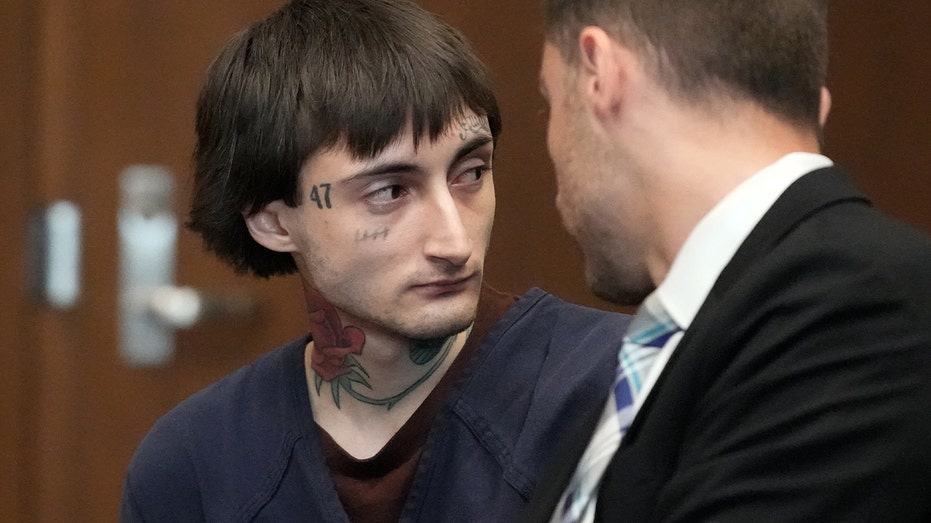Highland Park parade shooting suspect Robert Crimo III declines plea deal
Robert Crimo III rejected a plea deal in court on Wednesday that would circumvent a long jury trial. Initially his attorneys said he would accept the deal, but Crimo refused.

The Highland Park Fourth of July parade shooting suspect, who killed 7 and injured dozens by firing into a crowd in 2022, backed out of a plea deal that would save survivors the trauma of testifying in court.
Robert Crimo III, 23, initially pleaded not guilty to 21 counts of first-degree murder, 48 counts of attempted murder and 48 counts of aggravated battery in August 2022. Since then, he has remained incarcerated at the Lake County Jail, per online records.
If Crimo had pleaded guilty to a reduced seven counts of first-degree murder and 48 counts of aggravated battery with a firearm, Lake County prosecutors offered to dismiss the remaining charges against him.
SURGEON GENERAL DECLARES FIREARM VIOLENCE IN AMERICA A PUBLIC HEALTH CRISIS
Crimo's attorneys initially said that their client would accept the deal in court on Wednesday morning, Fox 32 Chicago reported. However, Crimo did not respond directly when he was asked by Judge Victoria Rossetti if he had reviewed the deal with his attorneys.
The alleged mass shooter, who appeared in court in a wheelchair for unknown reasons, was wheeled out of the room for a recess.
When he returned, he said he would not accept the plea deal, Fox 32 reported.
Crimo's tentative trial date is set for Feb. 24, 2025. Wednesday's developments come nearly a week before the Fourth of July, which will mark two years since Crimo opened fire at Highland Park's Independence Day Parade.
FBI REPORT REVEALS WHAT MOST ACTIVE SHOOTER SITUATIONS HAVE IN COMMON
"It’s been a lot, it’s a heavy week, the Fourth of July is around the corner," said Ashbey Beasley, who lives in Highland Park, told Fox 32. "And I think every single time there is a hearing, there are a lot of feelings."
Mike Bonamarte, who represents three people injured in the shooting, told Fox 32 that his clients were among the victims contacted by the Lake County State's Attorney's Office about Wednesday's possible plea change.
"All three of them were shot in the leg, there’s varying degrees of injuries. Zoe had a fractured femur, multiple surgeries, she was out of work for a long time, she’s a Chicago schoolteacher. She’s back to work now, but with accommodations," Bonamarte, managing partner of Levin & Perconti, told the outlet.
Before Wednesday's hearing, Bonamarte said that the plea agreement could bring closure to his clients.
"But as you can imagine, the emotional suffering that all three of them have experienced continues to this day," said Bonamarte.
Beasley, who escaped the gunfire with her family two years ago, said before the hearing that the plea was an opportunity to "close a door… and be able to really focus on healing."
HIGHLAND PARK MASS SHOOTING SUSPECT'S FATHER ROBERT CRIMO JR. WILL FACE TRIAL, JUDGE RULES
"I think knowing he is behind bars and can never harm another person is what everyone wants to see," Beasley said.
The City of Highland Park will hold a series of events that officials say will "balance the diverse needs within the community by providing space for remembrance as well as familiar [Fourth of July] traditions."
In Illinois, a defendant found guilty of first-degree murder involving at least two different people could face an automatic sentence of life in prison without the possibility of parole.
Monu Bedi, professor at DePaul University College of Law, told WBEZ Chicago that Crimo's attorneys were likely considering a plea deal because it would be their client's only chance at eventual release if he is convicted.
"By pleading guilty instead, the defense avoids this automatic mandatory life sentence and has the opportunity to potentially present mitigating evidence, such as mental health problems, family issues, etc., which may persuade the judge to give a sentence less than natural life," Bedi told the outlet, acknowledging that it would be unlikely for the judge to give a sentence shorter than natural life without parole due to the number of victims and alleged premeditated nature of the attack.


